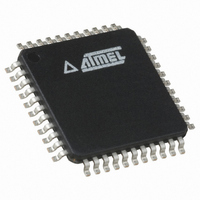ATMEGA323-8AC Atmel, ATMEGA323-8AC Datasheet - Page 41

ATMEGA323-8AC
Manufacturer Part Number
ATMEGA323-8AC
Description
IC AVR MCU 32K 8MHZ COM 44TQFP
Manufacturer
Atmel
Series
AVR® ATmegar
Datasheet
1.ATMEGA323L-4PC.pdf
(247 pages)
Specifications of ATMEGA323-8AC
Core Processor
AVR
Core Size
8-Bit
Speed
8MHz
Connectivity
I²C, SPI, UART/USART
Peripherals
Brown-out Detect/Reset, POR, PWM, WDT
Number Of I /o
32
Program Memory Size
32KB (16K x 16)
Program Memory Type
FLASH
Eeprom Size
1K x 8
Ram Size
2K x 8
Voltage - Supply (vcc/vdd)
4.5 V ~ 5.5 V
Data Converters
A/D 8x10b
Oscillator Type
Internal
Operating Temperature
0°C ~ 70°C
Package / Case
44-TQFP, 44-VQFP
Lead Free Status / RoHS Status
Contains lead / RoHS non-compliant
Other names
ATMEGA3238AC
- Current page: 41 of 247
- Download datasheet (4Mb)
Calibrated Internal
RC Oscillator
Oscillator Calibration Register
– OSCCAL
Special Function IO Register –
SFIOR
1457G–AVR–09/03
The calibrated internal Oscillator provides a fixed 1.0 MHz (nominal) clock at 5V and
25 C. This clock may be used as the system clock. See the section “Clock Options” on
page 6 for information on how to select this clock as the system clock. This Oscillator
can be calibrated by writing the calibration byte to the OSCCAL Register. When this
Oscillator is used as the chip clock, the Watchdog Oscillator will still be used for the
Watchdog Timer and for the Reset Time-out. For details on how to use the pre-pro-
grammed calibration value, see the section “Calibration Byte” on page 188.
• Bits 7..0 – CAL7..0: Oscillator Calibration Value
Writing the calibration byte to this address will trim the internal Oscillator to remove pro-
cess variations from the Oscillator frequency. When OSCCAL is zero, the lowest
available frequency is chosen. Writing non-zero values to this register will increase the
frequency of the internal Oscillator. Writing $FF to the register gives the highest avail-
able frequency. The calibrated Oscillator is used to time EEPROM and Flash access. If
EEPROM or Flash is written, do not calibrate to more than 10% above the nominal fre-
quency. Otherwise, the EEPROM or Flash write may fail. Note that the Oscillator is
intended for calibration to 1.0 MHz, thus tuning to other values is not guaranteed.
Table 11. Internal RC Oscillator Frequency Range
• Bit 7..4 – Res: Reserved Bits
These bits are reserved bits in the ATmega323 and always read as zero.
• Bit 3 – ACME: Analog Comparator Multiplexer Enable
When this bit is set (one) and the ADC is switched off (ADEN in ADCSR is zero), the
ADC multiplexer selects the negative input to the Analog Comparator. When this bit is
cleared (zero), AIN1 is applied to the negative input of the Analog Comparator. For a
detailed description of this bit, see “Analog Comparator Multiplexed Input” on page 126.
• Bit 2 – PUD: Pull-up Disable
When this bit is set (one), all pull-ups on all ports are disabled. If the bit is cleared (zero),
the pull-ups can be individually enabled as described in the chapter “I/O Ports” on page
137.
Bit
$31 ($51)
Read/Write
Initial Value
Bit
$30 ($50)
Read/Write
Initial Value
OSCCAL Value
$7F
$FF
$00
CAL7
R/W
7
0
R
7
–
0
CAL6
R/W
6
0
R
6
–
0
CAL5
R/W
5
0
R
5
–
0
Min Frequency (MHz)
CAL4
R/W
4
0
R
4
–
0
0.5
0.7
1.0
CAL3
ACME
R/W
R/W
3
0
3
0
CAL2
R/W
PUD
R/W
2
0
2
0
ATmega323(L)
Max Frequency (MHz)
CAL1
R/W
PSR2
R/W
1
0
1
0
1.0
1.5
2.0
CAL0
R/W
PSR10
0
0
R/W
0
0
OSCCAL
SFIOR
41
Related parts for ATMEGA323-8AC
Image
Part Number
Description
Manufacturer
Datasheet
Request
R

Part Number:
Description:
Manufacturer:
Atmel Corporation
Datasheet:

Part Number:
Description:
Manufacturer:
ATMEL Corporation
Datasheet:

Part Number:
Description:
IC AVR MCU 32K 16MHZ 5V 44-QFN
Manufacturer:
Atmel
Datasheet:

Part Number:
Description:
IC AVR MCU 32K 16MHZ 5V 40DIP
Manufacturer:
Atmel
Datasheet:

Part Number:
Description:
IC AVR MCU 32K 16MHZ 5V 44TQFP
Manufacturer:
Atmel
Datasheet:

Part Number:
Description:
IC AVR MCU 32K 16MHZ IND 40-DIP
Manufacturer:
Atmel
Datasheet:

Part Number:
Description:
IC AVR MCU 32K 16MHZ IND 44-TQFP
Manufacturer:
Atmel
Datasheet:

Part Number:
Description:
MCU AVR 32KB FLASH 16MHZ 44TQFP
Manufacturer:
Atmel
Datasheet:

Part Number:
Description:
MCU AVR 32KB FLASH 16MHZ 44QFN
Manufacturer:
Atmel
Datasheet:

Part Number:
Description:
MCU AVR 32K FLASH 16MHZ 44-TQFP
Manufacturer:
Atmel
Datasheet:

Part Number:
Description:
IC AVR MCU 32K 16MHZ COM 40-DIP
Manufacturer:
Atmel
Datasheet:

Part Number:
Description:
IC AVR MCU 32K 16MHZ COM 44-QFN
Manufacturer:
Atmel
Datasheet:

Part Number:
Description:
IC AVR MCU 32K 16MHZ COM 44-TQFP
Manufacturer:
Atmel
Datasheet:










